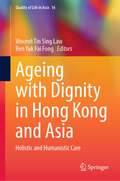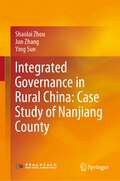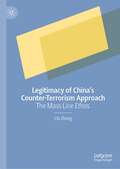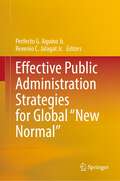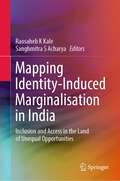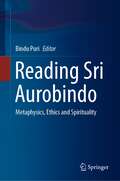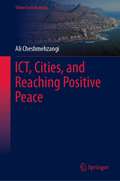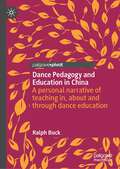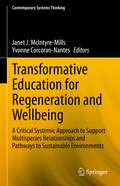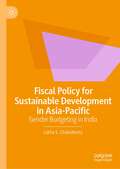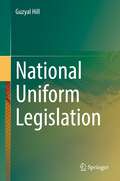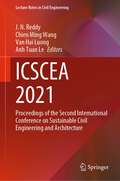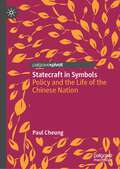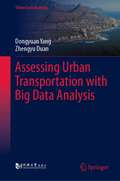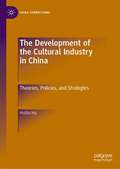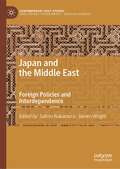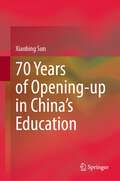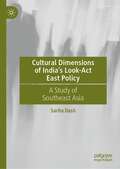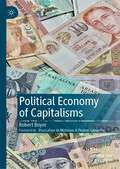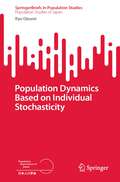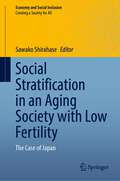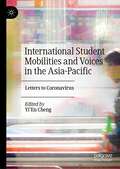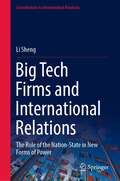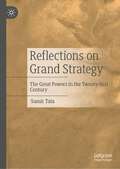- Table View
- List View
Ageing with Dignity in Hong Kong and Asia: Holistic and Humanistic Care (Quality of Life in Asia #16)
by Vincent Tin Sing Law Ben Yuk Fai FongThis book advocates the application of holistic and humanistic approaches in elderly care and services to achieve the goal of ageing with dignity in Hong Kong and Asia. It responds to the needs of an increasing ageing population that has to deal with related health needs in long-term care, community health and social services, particularly for chronic conditions and psychosocial support. The book consists of three sections on policy and development of aged care, holistic and humanistic care for older adults, and capacity building for ageing with dignity, respectively. Topics include the latest initiatives in aged care, appropriate services and delivery models, lifestyle modification, psychosocial and environmental considerations, professional development, technologies, and social capital. The chapters review and discuss these issues within a global context, illustrated by examples from Asian countries, underpinned by locally based empirical research. Contributors include academics and practitioners from diversified professional backgrounds that include medicine, nursing, pharmacy, traditional Chinese medicine, dietetics, and allied health. The book traverses into territories in the social sciences, life sciences, and sports sciences, while also touching on areas of business and administration, hospitality, law, public policy, and information technology in connection with public health. The contents serve as a topical reference for tertiary studies in ageing and related disciplines such as well-being and are also useful to policymakers, community and public health practitioners, health executives and interns working in areas of policy and practice pertinent to care development, health delivery models, planning, quality, ethics, better health promotion, professional training, and monitoring for older adults.
Integrated Governance in Rural China: Case Study of Nanjiang County
by Shaolai Zhou Jun Zhang Ying SunThis book adopts the methods of field investigation and case study, systematically summarizes the development course of Nanjiang County in Sichuan Province since China’s reform and opening-up, and comprehensively sorts out its main experiences of promoting green development and rural governance. These experiences not only have great enlightening and demonstration significance to the 80 counties that belong to the Qinba mountain area, but also have important reference value to promote rural revitalization and realize effective governance in the vast mountainous areas and counties throughout the country. Therefore, this book is not only suitable for ordinary readers interested in China's reform and opening up, but also suitable for professional researchers interested in China's green development and rural governance.
Legitimacy of China’s Counter-Terrorism Approach: The Mass Line Ethos
by Chi ZhangThis book examines how the Chinese Communist Party (CCP) has sought to legitimise its counter-terrorism strategy in the eyes of its domestic and international audiences. An important element of CCP policy in Xinjiang has been the deployment of ordinary Chinese citizens, or the 'mass line,’ to create new realities on the ground. This book explores how the history of ideological struggle in the PRC has taken on new characteristics, as well as offering insight into how the CCP has maintained legitimacy in the eyes of its population, even as it pursues policies which are internationally controversial, shedding light on the past and future of the behaviour of the Chinese state, a subject of interest to China scholars, scholars of the Belt and Road, and counter-terrorism experts.
Effective Public Administration Strategies for Global "New Normal"
by Perfecto G. Aquino Jr. Revenio C. Jalagat Jr.This book analyzes the recent discussions on the practices, issues, challenges and strategies of various public organizations and service organizations in light of the ongoing global pandemic. The book investigates how such organizations have managed to sustain the changes brought on to operations due to the new normal business environment and, in doing so, provides lessons and insights on how similar strategies could be implemented successfully in other organizations. This book would be a valuable read for policy makers, decision makers of public organizations, and scholars.
Mapping Identity-Induced Marginalisation in India: Inclusion and Access in the Land of Unequal Opportunities
by Raosaheb K Kale Sanghmitra S AcharyaThis book discusses the issues of inequality and marginalization in India. The first section of the book contextualizes sociological traditions for the scrutiny of subaltern discourse on discrimination. The chapters in the section explore self-identity, ‘margins’ in sociological traditions, subalternity and exclusion, citizenship issues of de-notified tribes, the role of religion for scheduled tribe Dalits and Ambedkar’s ideas on tribes. The second section deals with the political economy of higher education, health and employment. The efforts of BR Ambedkar and the consequences of those efforts, his critique of education policies during British time and its alteration for independent India have been meticulously dealt with. The third section illustrates an application of theoretical understanding through narratives of labour bondage in Varanasi, sanitation workers in Mumbai and rickshaw pullers in Delhi. The last section establishes that unequal access to resources is a consequence of discrimination and marginalization induced by social identities. The book argues for equitable access to resources and opportunities to ensure health equity. The audience for this publication includes academics, researchers, health professionals, policymakers engaged with discrimination, exclusion, marginalization and inequity in health.
Reading Sri Aurobindo: Metaphysics, Ethics and Spirituality
by Bindu PuriThis book presents contemporary perspectives of scholars working on different aspects of the philosophy of Sri Aurobindo- the idea of evolution, integral yoga, the transformation of the individual, society and earth, theories of nation and human unity, philosophy of emotions and ethics of the environment. Contributors examine Sri Aurobindo’s philosophy, its close conceptual relationship to classical Indian philosophy and its relevance. It sheds light on how his philosophy deals with the twenty-first century's fundamental problems and offers possible solutions. The book brings out the modern debate in Western philosophy involving thinkers like Michel Foucault, Jacques Derrida and Gilles Deleuze, and their predecessors, such as Martin Heidegger and Friedrich Nietzsche. This book is an exercise in comparative Philosophy,one that unpacks the mind of Sri Aurobindo in the context of Indian, European and Anglo-American philosophical discourse. It is of great relevance for a new generation of students, scholars of Indian philosophy, politics, religious studies and those interested in knowing the thought and practice of the twentieth-century Indian, thinker and yogi, Sri Aurobindo.
ICT, Cities, and Reaching Positive Peace (Urban Sustainability)
by Ali CheshmehzangiThis book is the first attempt to explore the use and application of Information and Communication Technology (ICT) and related smart technologies in cities and for the sole purpose of reaching positive peace. The everyday usage of digital technologies in cities encourages us to study the benefits, co-benefits, disadvantages, and threats of ICT application in cities and urban environments. The continuous growth of digital technologies and their growing demand in everyday urban practices and systems are already known to scholars, practitioners, and policy-makers. However, this book explores whether or not such applications and usage help us reaching positive peace. This approach is novel in the field of urban studies, allowing us to identify and highlight best practices, successes, and failures of ICT application to meet positive peace pillars. The scope of the book highlights our focus on positive peace and its eight pillars, mainly how they are meant to be achieved in cities and urban areas. With an analytical view on the topic, we aim to reflect on the systematic features of urban systems, using positive peace pillars as the primary targets. We believe ICT application and usage in cities could be more directive and beneficial to reach peace and prosperity to achieve such a goal. Therefore, this book provides a holistic guideline and coverage of ICT use for positive peace pathways and peace-building practices. We hope the findings of the book help researchers and policy-makers to come up with novel and integrated strategies, ensuring that our everyday usage of digital technologies, ICT, and smart tools, are more meaningful and people-oriented.
Dance Pedagogy and Education in China: A personal narrative of teaching in, about and through dance education
by Ralph BuckThis pivot offers an innovative approach to dance education, bringing a creative and inclusive dance education pedagogy into Chinese dance classrooms. Associate Professor Ralph Buck’s experiences of teaching dance at the Beijing Dance Academy and the possible implications for dance education in China lie at the heart of this text. Through a critical examination of personal teaching practice, pedagogical issues, trends and rationales for dance education in the curriculum are highlighted. Informed by constructivist ideals that recognise dialogue and interaction, this pivot suggests that dance can be re-positioned and valued within educational contexts when pedagogical strategies and objectives are framed in terms of teaching and learning in, about and through dance education.
Transformative Education for Regeneration and Wellbeing: A Critical Systemic Approach to Support Multispecies Relationships and Pathways to Sustainable Environments (Contemporary Systems Thinking)
by Janet J. McIntyre-Mills Yvonne Corcoran-NantesThe edited volume advocates for teaching systemic ethics as a form of life-long learning within nature’s classroom to support social and environmental justice. This book also explains critical systemic thinking as both an individual and a collective responsibility through many ways of knowing spanning the arts and sciences to inspire creativity.This volume contributes to theory and practice by making suggestions as to how to re-frame the content, structure and process of education for transformation. This volume makes a case for a more relational understanding of human beings and other species. This volume also explores a more integrated curriculum where learners are given the opportunity to explore many ways of knowing and learning to earn, learn and grow a future through circular economies, co-operatives and learning communities. This book highlights how the models of sustainable development focus on education for wellbeing in line with the UNESCO approach outlined in 2021 that emphasizes the systemic nature of education rooted in protecting the environment and supported by the participation of active global citizens.This volume demonstrates transformation of our thinking and practice is overdue and calls for changing the narrative through our standing together and redesigning systems of education to prioritize a more holistic worldview that embraces the planet and living systems. The focus of this volume is on values, perspectives and ways to make a difference through addressing a range of practical concerns, such as: food, energy and water security.Ontologically the editors' perspective is shaped by recognising kinship with nature, as expressed by Indigenous custodians. Epistemologically the editors and contributors to this volume explore ways to enhance education based on working across cultures and disciplines using a cross cultural approach and mixed methodology. Axiologically the editors support the notion of transformative research that promotes balancing non-anthropocentrism with an approach that draws on Indigenous wisdom whilst addressing patriarchal notions through gender mainstreaming.
Fiscal Policy for Sustainable Development in Asia-Pacific: Gender Budgeting in India
by Lekha S. ChakrabortyThis book examines how macro-fiscal policy can lead to gender-aware human development in an emerging economy like India, with special reference to gender budgeting. Integrating gender lens in macro-fiscal policies has been widely recognized in international and national policy making and budgeting. The book highlights the gender diagnosis—the measurement issues relate to construction of gender outcome variables; the statistical invisibility of unpaid care economy sector and how deficiency in public infrastructure can accentuate the private costs; the analytical link between gender outcome variables and macro-fiscal policy frameworks; the role and impact of fiscal transfers on gender equality outcomes at subnational levels; time series of gender budgets in India across sectors and its fiscal marksmanship; gender disaggregated public expenditure benefit incidence analysis to understand the distributional impacts of public spending on women across income quintiles and suggest policy alternatives. The book uses unique database—time use survey data and the disaggregated demand for grants, expenditure budgets using gender lens. The book employs case study, simple statistical tools for the analysis and econometric methodology.
National Uniform Legislation
by Guzyal HillThis book aims to develop a conceptual framework upon which to draw for analysis of new and existing national reforms in Australia. Due to growth in the volume and complexity of national uniform legislation, law reform agencies, the Commonwealth, state and territory governments and policy institutions have more, rather than less, to do. This book explores how they are required to respond to debates among actors from divergent geographical, commercial and ideological backgrounds, who sometimes demonstrate irreconcilable differences in values and perspectives.From a policy implication perspective, this book summarises a vast quantity of original and complex data so that it can be applied in the field—among policymakers, reformers, legislative drafters, students and the wider audience of legal practitioners working with harmonised legislation in federations. This book acknowledges that uniform legislation is not a panacea for all legal challenges currently faced by federations. However, this book takes a step towards demystifying the many confusing factors that have obscured the underlying general principles. A working theory of ‘federal harmonisation’ enables ‘the art of the impossible’ to become a practical reality. This book condenses data on legislation in models. The models enable transparent, evidence-based decisions in the process of a federation’s harmonisation to progress regulatory best practices and achieve more reliable, sustainable results.
ICSCEA 2021: Proceedings of the Second International Conference on Sustainable Civil Engineering and Architecture (Lecture Notes in Civil Engineering #268)
by J. N. Reddy Chien Ming Wang Van Hai Luong Anh Tuan LeThis book presents articles from the Second International Conference on Sustainable Civil Engineering and Architecture, held on 30 October 2021 in Ho Chi Minh City, Vietnam. The conference brings together international experts from both academia and industry to share their knowledge, expertise, to facilitate collaboration and improve cooperation in the field. The book highlights the latest advances in sustainable architecture and civil engineering, covering topics such as offshore structures, structural engineering, construction materials, and architecture.
Statecraft in Symbols: Policy and the Life of the Chinese Nation
by Paul CheungThis book presents a study of how urban residency in China is regulated by state policy in the second decade of the 21st Century. Far from a straightforward divide between natives and newcomers, policy in this period has created delicate cross-classifications of internal migrants and attendant conditions under which they reside in particular urban areas. With reference to some of the most profound social theorists of the present day, such symbolic acts of division are explained as acts of statecraft carried out by different levels of public administration in the face of multiple quandaries. The book will appeal to those with an interest in the governance of population and territory in China, and by extension, in other parts of the contemporary world.
Assessing Urban Transportation with Big Data Analysis (Urban Sustainability)
by Dongyuan Yang Zhengyu DuanThis book chiefly focuses on urban traffic, an area supported by massive amounts of data. The application of big data to urban traffic provides strategic and technical methods for the multi-directional and in-depth observation of complex adaptive systems, thus transforming conventional urban traffic planning and management methods. Sharing valuable insights into how big data can be applied to urban traffic, it offers a valuable asset for information technicians, traffic engineers and traffic data analysts alike.
The Development of the Cultural Industry in China: Theories, Policies, and Strategies (China Connections)
by Huilin HuThis volume addresses the rapid growth of China’s cultural industry and its significant cultural and economic impact on the country. It considers what exactly constitutes the cultural industry, defining the basis for discussions on issues as the internal tensions constraining China’s cultural industry development. It examines the place of culture and cultural industry in relation to China’s overall development, and what kinds of strategies, policies and concrete measures are most effective in promoting the industry’s growth, exploring the role of Government in Cultural Industrial Development.
China and America: Destined for Conflict?
by Wenzhao TaoThis book explores the possibility and feasibility of building a new model of major-country relations between China and the United States, which is of great significance to the sound interaction between the two countries and the preservation of peace and stability of the world. In early June 2013, Chinese President Xi Jinping and US President Barack Obama reached a consensus on building a new model of major-country relations at the historical Sunny lands meeting in California. In the years that followed, the two leaders were committed to that goal despite the different interpretations in its substance. How is the new model of major-country relations conceptualized and developed? What renders it possible? Is the major-country conflict inevitable? These are the basic issues addressed in this book. Now, China-US relations are at a critical juncture. The international community is watching the world’s two largest economies and is quite concerned about the future of one of the world’s most complicated bilateral relationships. This timely publication of Professor Tao Wenzhao provides us with a realistic approach to managing this vital relationship in a candid and balanced way.
Japan and the Middle East: Foreign Policies and Interdependence (Contemporary Gulf Studies)
by Satoru Nakamura Steven WrightThe book provides a comprehensive analysis of the emergence, political economy and foreign relations of Japan’s relations with the Middle East, with an emphasis on its relations with the states in the Gulf Region. It offers both country specific case studies and thematic chapters, providing comprehensive study on Japan’s relations with the Gulf and the wider Middle East. Japan enjoys a strategic partnership with the Arab Gulf countries in terms of its energy trade, yet this has morphed into a wider trading relationship with the wider Middle East. The book studies Japan’s relations with Israel, Egypt and Turkey, covering security, the oil sector and the LNG sector Middle East. This will allow this book to go beyond its rich analytical and empirical content.
70 Years of Opening-up in China’s Education
by Xiaobing SunThis book gives a panoramic review and summary on the opening up of China’s education to the outside world. Firstly, it introduces the connotation of international education, the development history of international education in China, national legislation and vital released documents. It also provides a general view of historical actuality and classic cases interpretation on the principal components of China’s international education, namely overseas studying, international students studying in China, Sino-foreign cooperative education, overseas school running, cultural exchanges with other countries, multilateral exchanges, “the Belt and Road” educational actions and macro-management departments of international education. This book is bilingual in both Chinese and English and is an essential guidebook for readers to understand how international education has developed in China
Cultural Dimensions of India’s Look-Act East Policy: A Study of Southeast Asia
by Sarita DashTracing the cultural interactions between South and Southeast Asia since prehistoric times, the book critically scrutinizes the current cultural diplomacy initiatives of India´s Look-Act East Policy. Reminding the need to look at culture as a two-way process and the need to re-define the understanding of culture in its Space Age setting, the author emphasizes on India realising its unique multicultural potentiality to broaden the outlook and parameters of cultural diplomacy to suit the unfolding World Order in the region. The nature and composition of the demography of Southeast Asia and its Indian diaspora calls for a balanced approach in covering the land and maritime sectors, the book further observes. Adopting a peoples-centric approach, the author argues for cultural interactions to go beyond the union government and its agencies and advocates for the role of state governments, non-governmental actors, and other community initiatives as well.
Political Economy of Capitalisms
by Robert BoyerThis book is the English language translation of the French publication Économie Politique des Capitalismes. Research in this book presents institutional and historical macroeconomics, through an analysis of wage-labour nexus, innovation systems, monetary and financial systems, integration into the world economy, formation of economic policy configurations, and the history of economic theories. In doing so, the book addresses how and why economic regularities change in long run, and why do macroeconomic adjustments differ across countries within the same historical period. It shows how institutional changes that have occurred since the 1970s and the research on the transformation of the American and French capitalism, have led to the emergence of a research agenda, known as Régulation Theory. Readers would understand the permanent transformations of capitalism and its crises, given the book’s inclusion of long-term historical studies, systematic international comparisons for the contemporary period, and the exploration of the institutional and social foundations of microeconomics which has led to the evolution of various brands of capitalism. This translated work includes an introductory chapter by Prof. Elsa Lafaye de Micheaux and Thomas Lamarche.
Population Dynamics Based on Individual Stochasticity (SpringerBriefs in Population Studies)
by Ryo OizumiThis book demonstrates that population structure and dynamics can be reconstructed by stochastic analysis. Population projection is usually based on age-structured population models. These models consist of age-dependent fertility and mortality, whereas birth and death processes generally arise from states of individuals. For example, a number of seeds are proportional to tree size, and amount of income and savings are the basis of decision making for birth behavior in human beings. Thus, even though individuals belong to an identical cohort, they have different fertility and mortality. To treat this kind of individual heterogeneity, stochastic state transitions are reasonable rather than the deterministic states. This book extends deterministic systems to stochastic systems specifically, constructing a state transition model represented by stochastic differential equations. The diffusion process generated by stochastic differential equations provides statistics determining population dynamics, i.e., heterogeneity is incorporated in population dynamics as its statistics. Applying this perspective to demography and evolutionary biology, we can consider the role of heterogeneity in life history or evolution. These concepts are provided to readers with explanations of stochastic analysis.
Social Stratification in an Aging Society with Low Fertility: The Case of Japan (Economy and Social Inclusion)
by Sawako ShirahaseThis edited book empirically discusses stratification in contemporary Japanese society. It is unique for its examination of social inequality in relation to declining fertility and an aging population. Japan is the most aged society in the world: according to the Statistics Bureau of Japan, people who are aged 65 and above comprised 29.1% of the country’s total population in 2021. Meanwhile, the fertility rate has continuously declined since the mid-1970s. Japan experienced a dramatic change in its demographic structure in a short period of time. Such fast change could be a major factor that generated social stratification. In her industrialization, Japan was thought to share a pattern of social stratification similar to that of developed European and North American countries but with a low degree of socio-economic inequality and a high degree of homogeneity. There is no clear support for this description of Japan, although the country does share a pattern and degree of social stratification similar to that observed in Europe and North America. The social stratification theory has been developed in close relationship to the labor market; however, it is necessary to further examine the social stratification of very aged societies in which a substantial number of the population—namely, retired persons—no longer have any ties to the labor market. In this book, the contributors explore the pattern of social stratification at three life stages: young, middle-aged, and elderly. Included are discussions of various aspects of stratification such as education, work, wealth, marriage, family, gender, generation, and social attitudes.
International Student Mobilities and Voices in the Asia-Pacific: Letters to Coronavirus
by Yi’En ChengThis edited volume explores core questions on education and transnational mobility in a time characterized by a global pandemic, recasting them through the lenses of regimes, experiences, and aspirations. The volume brings together 19 short essays in the form of letters addressed to the coronavirus and written by international students , together with nine striking illustrations that depict emotive scenes from the essays, and nine academic commentaries that analytically link these personal narratives to broader societal structures. This book represents a timely intervention, providing an intimate glimpse into young people’s hopes and the challenges they face concerning their education and mobility.
Big Tech Firms and International Relations: The Role of the Nation-State in New Forms of Power (Contributions to International Relations)
by Li ShengThis book presents cutting-edge research and exploration of the role of nation-state when big tech firms present themselves as new participants in contemporary international relations that act on an equal footing with nation-states. The general research goal of this book is to identify the justifications that nation-states have adopted to regulate the big tech firms and the impacts of this process on international trade in the main economies in the world. With the massive instrumentation of data, big tech firms have become actors with the capacity to intervene not only in economies but also, above all, in the politics of different countries with different systems. The emergence of big tech firms has transformed the approach to the concepts of national security, information management and access to new technologies among nation-states. The principles and fundamentals of cyber sovereignty have become one of the bases of states in the contemporary system of international relations. Today, the influence of big tech firms in different societies in the contemporary world is one of the main forms of power. This book tries to collect and present the recent state of the art in studies on the relationship between big tech firms and nation-states in the literature. It also addresses how governments such as those of the US, China and the EU are changing their legislation, creating control and data security mechanisms, imposing entry restrictions on foreign companies, and regulating the actions beyond the cloud of big tech firms inside and outside their borders.
Reflections on Grand Strategy: The Great Powers in the Twenty-first Century
by Samir TataThe book provides an analytic framework for grand strategy and applies the framework to illuminate the grand strategies of the Great Powers of the twenty-first century: India, China, Russia, and the United States. The book also uses Coca-Cola as a case study to illustrate the potential influence of grand strategy on business strategy. The analysis is rigorous, logical, fact-based, historically rooted, and well-sourced with abundant endnotes to encourage further exploration by readers.
